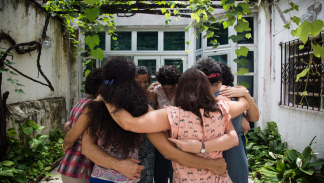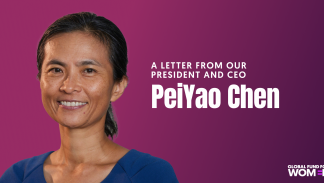UPDATED: Women’s Groups in Argentina Reach Historic Moment in Abortion Rights Effort
UPDATE AUGUST 9, 2018
Argentina’s senate has handed down a decision on the law that would allow for legal abortion in the first 14 weeks of pregnancy. With a vote of 38 to 31, the law was defeated.
Thousands of supporters and opponents of the law gathered in Buenos Aires to await the outcome of the historic vote. After hours of debate and an early morning vote, the Senate handed down their decision as crowds waited outside.
“The news of the Senate’s decision to vote down the law that would expand women’s access to legal abortion is disappointing, but a luta continua. The struggle continues, and we carry on,” says CEO and President of the Global Fund for Women Musimbi Kanyoro. “Access to safe and legal abortion is a fundamental right, and necessary for a woman to be able to decide on her future. We at the Global Fund for Women are incredibly inspired by the bold and courageous women in Argentina—women’s groups and activists who have worked for years to expand abortion rights, and who have made some incredible gains already. The work continues, until the day that all women in Argentina and around the world have access to comprehensive sexual health and reproductive rights, including safe and legal abortion.”
Despite the outcome of the Senate’s decision, women’s groups in Argentina feel that they are at a turning point in the effort for legal abortion, and they vow to continue their work.
“It seems to me that, in the story of this battle, we have arrived. All the young women who wear green handkerchiefs, out here in crowds, flooding our streets—I think they tell that story. There is no turning back,” says Ruth Zurbriggen, Director of Global Fund for Women grantee partner La Colectiva Feminista La Revuelta. “We are going to continue beyond today. We will continue to think of ways to break and go beyond our traditional limitations. We are going to continue demanding that safe abortion practices will be available to develop with or without the law, and we think that it will happen. But of course we need legality so that nobody, nobody, nobody dies for a secret and illegal abortion.”
The current law, which only allows for abortions in the case of rape or if the health of the woman is at risk, will stand. An estimated 500,000 illegal abortions a year are performed in Argentina, many leading to injury or death.
A HISTORIC MOMENT
On June 4, 2018, thousands of women and men in Buenos Aires stood in a sea of green (the color used to symbolize support for abortion rights), celebrating a victory that seemed impossible just months before. After a years-long battle for abortion rights led by women’s groups, Argentina’s lower house of Congress voted 129-125 in favor of decriminalizing abortion in the first 14 weeks of pregnancy.
HOW DID WE GET HERE?
After 13 years and six different rejected bills that would have expanded abortion rights, this victory marks an important legislative milestone. Currently, abortion is only legal in Argentina if a woman’s life is at risk, to preserve her physical health, or in the case of rape. Even in these circumstances, women in need of an abortion often struggle to find a doctor who will perform the procedure. As a result, an estimated 500,000 illegal abortions are performed a year, and illegal abortion is the leading cause of “maternal deaths” (classified as deaths of pregnant women, not just those who already have children) in Argentina.
The shift in support of abortion rights is part of a sea change of increased popular support for women’s rights—led by tenacious and bold women’s groups in Argentina. “I do not think of the current moment as a wave; I see it as a tsunami,” says Ruth Zurbriggen, coordinator of Global Fund for Women grantee partner Colectiva Feminista La Revuelta. “There are very few movements in the history of Argentina that have impacted women like this.”
Another key group involved has been Global Fund for Women grantee partner Colectiva Ni Una Menos, a collective born in 2015 of a public outcry against femicide (the killing of a woman or girl motivated by scorn and hate for her gender), and has now become a powerful movement for women’s rights more broadly—both in Argentina and beyond. After organizing successful and unprecedented public demonstrations protesting femicide, Ni Una Menos leaders set their sights on expanding the conversation around women’s rights, and in particular, on legalizing abortion.
“When we talk about abortion, we are not discussing biological life. Rather, we are discussing the autonomy of women; women with concrete realities, with dreams, with life stories,” says Marta Dillon, Director of Colectivo Ni Una Menos. “[Legalizing abortion] has to do with defending our autonomy, having our own agency, deciding about our life plans. This is now understood by a huge population, all of whom are demanding abortion rights.” In 2016 Ni Una Menos began organizing public support of abortion rights—which resulted in rallies attended by hundreds of thousands of supporters. The most recent demonstration in June 2018 had an estimated 800,000 people attending in Buenos Aires alone.
“This movement is about much more than legal abortion. It is about the great promise of being in control of one’s destiny,” says Ruth Zurbriggen. “This movement is doing all it can to undermine the very deep base of patriarchal, colonial, homophobic, and violent undertones of the society that we live in.”
WHAT’S NEXT?
The Senate will vote on the law on August 8—a vote which determines if the law is sanctioned. But even if the law passes, women’s rights movements are preparing for the challenges ahead.
“We are working strongly for the law to be approved, and we understand that if approved, the challenges are immense and they are many,” says Laura Zurbriggen of Soccoristas en Red. She adds that anti-rights groups are already mobilizing “an entire sector of the medical community…to deny women legal abortions by claiming ‘conscientious objection.’” Claiming “conscientious objection” allows medical professionals to cite their religious beliefs as a reason to refuse to perform the procedure.
Women’s groups also recognize that legislation alone is not enough to truly ensure women have access to abortion. “Part of the cultural battle has been won thanks to our activism, for which we are very happy and proud,” says Maria Elena Ale, of Soccoristas en Red. “We recognize that laws by themselves do not guarantee anything—but they do give a floor of symbolic and material possibilities.” Women’s groups are employing multiple strategies, including offering comprehensive sexual health education, working to reduce cultural stigma, and working with health care professionals to create networks of doctors willing to perform the procedure. “We want abortion care [and] humanized abortions,” says Ruth Zurbriggen of Colectiva Feminista La Revuelta. “We want abortions without stigma and safe abortion, so we have to keep working toward that.”
CHANGING THE CONVERSATION
Moving forward, women’s rights groups say that the abortion rights battle in Argentina—a deeply Catholic country—stands to be as cultural as it is political. Breaking down stigma around abortion means interrogating the approach presented by the Catholic Church, which frames abortion as an issue of sexual morality. Organizations like Global Fund for Women grantee partner Católicas por el Derecho a Decidir (Catholics for the Right to Decide), who have been working on abortion rights in Argentina for decades, “presents to women the possibility that Catholic beliefs and a woman’s right to choose can coexist,” says Marta Alanis of the Campaña Nacional por el Derecho al Aborto Legal, Seguro y Gratuito (Argentina’s National Campaign for the Right to Legal, Safe, and Free Abortion) and Director of Catholics for the Right to Decide.
Already there are indications that the conversation around abortion rights will never be the same—especially when it comes to the next generation. Women’s groups say that some of the loudest voices in support of abortion rights are those of young women, who are more willing than ever before to speak openly about their own experiences and sexuality. “The biggest groups of leaders that are emerging within this movement that has spread so quickly in recent years in Argentina are young women, who do not hesitate to stand on the street and declare that they are feminists,” says Laura Zurbriggen of Soccorista en Red. “They are eager for a feminism that is relevant to them, but most importantly, they recognize the possibility of intergenerational collaboration.”
No matter how the Senate votes on August 8, and despite the daunting battle ahead, change is underway. According to Marta Alanis from la Campaña Nacional por el Derecho al Aborto Legal, Seguro y Gratuito, “This law is not just a way to get legal and safe abortions without obstacles, it is more than that: It [represents the power of] a feminist movement. Demanding the right to abortion is becoming a feminist flame in each one of us.”
Global Fund for Women has supported abortion rights and access through groups like Colectiva Feminista La Revuelta and Colectiva Ni Una Menos for nearly 30 years. Despite successes in places like Uruguay and Poland, the right to abortion remains highly contested around the World and conservative trends and regressive cultural practices threaten the safety and choices of women.
The urgency of the times demands action, not only to support grantee partners to resist rollbacks to abortion rights, but also to equip women leaders, organizations, and movements with the skills and resources to create lasting social and legal change around this critical issue. Please join us in supporting women’s human rights and this vital work today.
SUPPORT WOMEN'S GROUPS AS THEY CONTINUE THE STRUGGLE
Join us as we continue to support women’s groups in Argentina and around the world as they fight conservative backlash in support of women’s rights.


